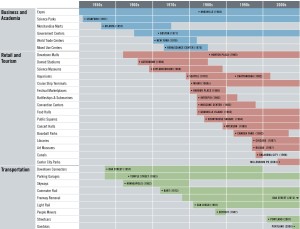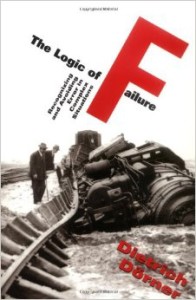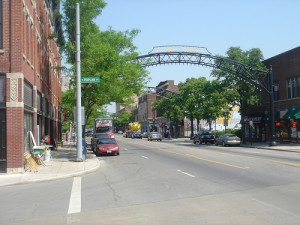In a previous posting on innovation, I talked about how coming up with innovative new ideas is surprisingly easy. It is actually trying to do them that is hard. I pointed out many of the structural barriers to this, most of which lie in the realm of organizational dynamics. One of the problems is what I call the “paradox of success”. That is, it is harder for someone, be it an individual or company, to do something new and different to the extent that what they are currently doing is already successful. This actually seems, like the … [Read more...]
The 31-Flavors of Urban Redevelopment
Aaron Renn’s March 24 posting on “The Logic of Failure” and his reference to “silver bullet” solutions for redevelopment and revitalization reminded me of my visit to the “Creative Cities Summit”, about revitalizing cities, three years ago this fall. The setting, timing and venue could not have been better, at least in terms of provoking thought about how to do things better. The setting was Detroit, the time was October, 2008, when the financial markets were crumbling, and the venue was Renaissance Center (“RenCen”), the Robocop-like mixed … [Read more...]
The Logic of Failure
"It is far from clear whether 'good intentions plus stupidity' or 'evil intentions plus intelligence' have wrought more harm in the world. People with good intentions usually have few qualms about pursuing their goals. As a result, incompetence that would otherwise have remained harmless often becomes dangerous...Failure does not strike like a bolt from the blue; it develops gradually according to its own logic. As we watch individuals attempt to solve problems, we will see that complicated situations seem to elicit habits of thought that set … [Read more...]
Beyond Brain Drain
[ I wrote this for a newspaper in Indianapolis, but it's applicable everywhere. - Aaron] Much of the anxiety around human capital in places like Indiana revolves around the so-called “brain drain,” or loss of educated young people after they leave school. But while many would-be brain drain plugs are without question valuable, especially those focused on boosting education, the problem is actually much more complex than that simple idea suggests. Firstly, a lot of the regions and states that have bled population don't have especially high … [Read more...]
The Importance of Social Structures to Urban Success
There seems to be a popular belief that what it takes to create an industry cluster in bioscience or whatever is to pair research with commerce. That is, to find an academic institution doing cutting edge research, and connect it with venture capital and entrepreneurs to start companies to commercialize it. Soon enough, you have a "cluster" of businesses that takes off like a rocket. This is the perceived Silicon Valley model, and no company epitomizes it more than Google, which was started by two Stanford students to commercialize their … [Read more...]
Yes There Are Grocery Stores in Detroit
[ I'm delighted to be able to share with you today a story from Jim Griffioen, a simply wonderful writer living in Detroit and author of Sweet Juniper, which is not exactly an urbanist blog, but like everything in Detroit is simply unlike anything else out there - and in a good way. I know you'll enjoy it - Aaron. ] I'm just one of about 800,000 people still living in the city of Detroit, Michigan, the nation's 11th most-populated city. Because of the events of the last half century, this is a city that journalists and academics love to … [Read more...]
Louisville – An Identity Crisis
Following on from my article on Cincinnati, I'll now take a short 100 mile trip downstream to another old river city, Louisville. Louisville came of age in a similar era and traditionally viewed itself as a sort of little brother to Cincinnati. However, while Cincinnati was once the Paris of the west, Louisville never held so lofty a position, so it lacks Cincy's grandeur. Luckily, it also appears to be missing some of the dysfunction. See here the river city tradition as the Belle of Louisville steamboat fires up. There were obviously no … [Read more...]
There’s No Such Thing As Green Industry
I have always been skeptical of the idea of green industry. The bifurcation between green and non-green industry seems destined to be a temporary transitional state. In the future, probably less than a decade, there will only be industry, it will all be green, with only a few legacy exceptions winding down into the sunset. This immediately begs the question, if America isn't doing so well in non-green industrial development in an ever more competitive globalized world, why would we think that it will be any better for green industry? Why … [Read more...]
Columbus – The New Midwestern Star
Columbus, Ohio is by far the best performing city in Ohio. In a state that has become a byword for the challenges and pain of de-industrialization, Columbus is a clear standout, with strong economic and population growth. A lot of the analysis of what makes Columbus different from Cleveland, Toledo, Dayton, Youngstown, and even Cincinnati often starts out by noting all the advantages Columbus had. It is the state capital. Ohio State University is there. It was not a traditional heavy manufacturing center (less true than you might think), and … [Read more...]
Chicago’s Structural Advantages (and Professional Services 2.0)
It's no secret that Illinois, like the rest of America, has been suffering in this economy. It also has the dubious distinction of probably being in the worst fiscal shape in America. llinois Gov. Pat Quinn appointed a group called the Illinois Recovery Commission to examine the state's future, who recently issued their final report. As is mandatory in this genre of document, the commission devoted a lot of ink to creating a "culture of innovation" in Illinois and putting it in the forefront of new economy businesses. Illinois may exists as … [Read more...]
- « Previous Page
- 1
- …
- 12
- 13
- 14
- 15
- 16
- …
- 18
- Next Page »




